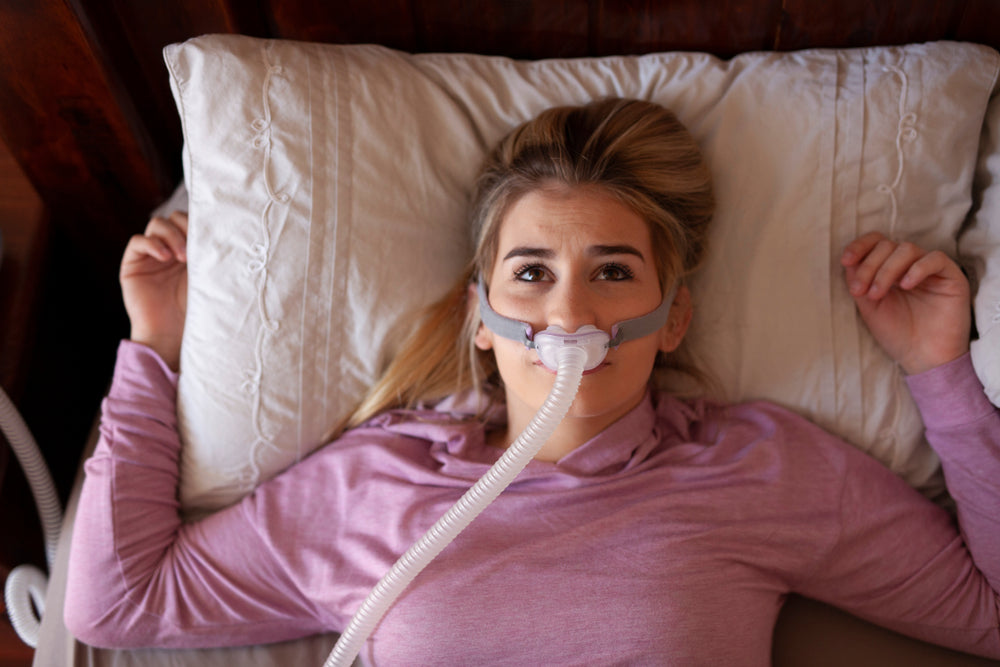What's the difference between a CPAP machine and an APAP machine?
If you have found yourself researching the difference between a CPAP machine and an APAP machine, chances are you or somebody you care about is looking for the solution to sleep apnea. Finding the right treatment option for sleep apnea is essential to ensure a comfortable and safe night's sleep. Apnea treatment is highly individualised. CPAP is more popular with some people, while others prefer APAP. We'll tell you the differences between the two options and how you can decide which is best for you or your loved one.
How does APAP differ from CPAP?
CPAP and APAP machines are both devices used to treat obstructive sleep apnea. Both machines are used to monitor airflow and keep the airway open throughout the night to avoid lapses in breathing. However, they have different methods for how the air is distributed. A CPAP machine (continuous positive airway pressure) like the ResMed AirSense 10 Elite CPAP Machine uses a constant setting, distributing a continuous airflow at the same pressure. In contrast, an APAP machine (automatic positive airway pressure) like the ResMed AirSense 10 AutoSet 3G responds to the changing pressure and adjusts the settings depending on the pressure required. This means that an APAP machine can stay on a relatively low setting throughout the night until the breathing suggests that more airflow is needed. This sophisticated ability is where the "automatic" in the name comes from.
So while the CPAP machine delivers a constant flow of air pressure, APAP devices are more personalised and adjust the pressure by monitoring the wearer's breathing and adapting to the minimum pressure needed to keep the upper airway open and deliver air. In turn, they are creating a more natural breathing pattern.
Are there only two options?
There are three major types of PAP therapy for sleep apnea. This means there is also a third option; BiPap machines have two levels of pressure, one for inhaling and one for exhaling. You can read more about that in our article BiPap vs CPAP machines for sleep apnea.
Other differences between CPAP and APAP to consider
Core function aside, some other areas in which CPAP therapy and APAP therapy differ may influence which sleep apnea machine best suits your treatment needs.
But first, let's discuss similarities. Both devices are of a similar size (about the size of a lunchbox), and both come with an attached mask and tube. In terms of noise levels, CPAP and APAP machines have come a long way, and the newer (and smaller) machines tend to make a minimal amount of noise that doesn't disturb the wearer or anybody else sleeping in the bedroom. On to the differences…
Availability
Most of the time, a doctor or health professional will first prescribe a CPAP machine before an APAP machine. CPAP machines are extensively available. However, APAP machines may have more limited availability. We have both devices available to ensure we can offer our customers the best solution for their personal needs.
Cost
While the cost of CPAP machines and APAP machines are in the same ballpark, APAP machines are slightly more expensive. This slight cost increase exists because not only can an APAP machine automatically adjust to the wearer's needs, but it can also act as a CPAP machine. APAP machines are more complicated and intuitive; this doesn't necessarily mean they are the better option for everyone, but it increases the cost slightly.
Effectiveness
Regarding efficiency, the answer to which machine is more effective depends entirely on the individual's needs. Treating obstructive sleep apnea isn't a one shoe fits all approach, and without having all of the information, it's difficult to predict which machine will work best. For this reason, we always recommend having an in-person meeting with one of our expert consultants. There are many different options on the market, and it's not uncommon for potential customers to become overwhelmed and decision fatigued. We want to ensure this process is as straightforward as possible for you, and when you decide to invest in a solution, it will last you for years to come and provide relief through peaceful and comfortable sleep.
APAP doesn't need adjustment
If circumstances change, for example, if the patient using the APAP machine loses weight or even has a blocked nose or allergies - the machine adapts. This is a convenient option compared to the CPAP machine, which would need to be manually adjusted based on lifestyle changes.
Where to from here?
To find the answer to which machine is better suited to you and your needs, we recommend you book in with one of our expert consultants today. By speaking with somebody who is expertly trained in the field, you can relax knowing that your needs are being put first before making a sale. So often, people have struggled with an ill-fitted product that doesn't work for them after ordering online and not discussing their individual needs. For example, some machines aren't best suited to certain health conditions. This is why we recommend an in-person consultation, to ensure we can find a treatment plan that works for you and find a machine that you can rely on, night after night.


